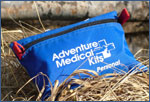Page Content
Health
Nutrition
In order to safely participate in any outdoor activity, you need to properly fuel and hydrate your body. Before heading outside, grab a nutritious snack such as a piece of fruit, yogurt, a handful of nuts and some water or juice to hydrate and pump up your energy stores. Pack an additional nutritious snack and water to take along.
Pay attention to your hunger patterns and be able to recognize when your body needs food. It’s better to fuel your body before you’re feeling the effects of hunger. Never let yourself get to the point of feeling ravenous – the blood sugar swings can make you feel very tired very quickly. It’s best to eat several small meals each day and maintain consistent blood sugar levels.
Check Canada's Food Guide for healthy eating guidelines and nutritional tips.
Physical Training
At the start of each season, ease into your activities. It may have been a while since you asked your body to participate in a particular sport, so don’t over-exert yourself early on. Try to do some sport-specific training before and during the season to keep your body working efficiently. There are loads of websites and books geared toward sport-specific training that you can check out.
Pay attention to your physical limitations and learn to recognize the signs of your body fatiguing. Knowing what you’re physically capable of – and respecting those limits – is invaluable when it comes to trip safety.
And don’t forget to stretch…your muscles will thank you later!
Mental Preparation
Your first line of defense in any situation you might encounter while enjoying the great outdoors is your common sense. Many people spend countless hours training to become physically prepared for outdoor pursuits; however, not nearly as many consider the mental preparation required.
Do you know your limits ... and are you prepared to play within them? Are you confident enough to call it a day when conditions change or if you find you’re not feeling physically up to the challenge ahead? Do you run through survival scenarios in your mind and imagine a positive outcome EVERY TIME? Do you practice positive thinking and maintain a survivor mentality?
Without mental strength and endurance, your physical strength and skills can be severely compromised. Remember to train your mind as often as you train your body.
Safety
Be sure to carefully research the inherent risks for your chosen activity, and ensure that you have the proper, functioning safety equipment with you before you head out. Check the gear recommendations on each sport-specific page in our website for some ideas. Most importantly, ensure that you know how to use your safety gear and train with it to keep your skills fresh!

Take courses in first aid, CPR and Lifesaving. Also ensure that you have an adequate first aid kit in your pack. Consider how long you will be out and the number of people you’re traveling with when deciding how complex your fist aid kit should be. For a day trip, a basic first aid kit will do. Anything longer and you should expand the contents accordingly. Just like your safety gear, ensure that your first aid skills are up-to-date and that you review them constantly.
Safety skills and knowledge diminish over time…as the saying goes, “If you don’t use it, you lose it.” It’s your responsibility to be aware of and prepared for the dangers and unplanned situations that may arise outdoors. Safety is a big part of being AdventureSmart!


